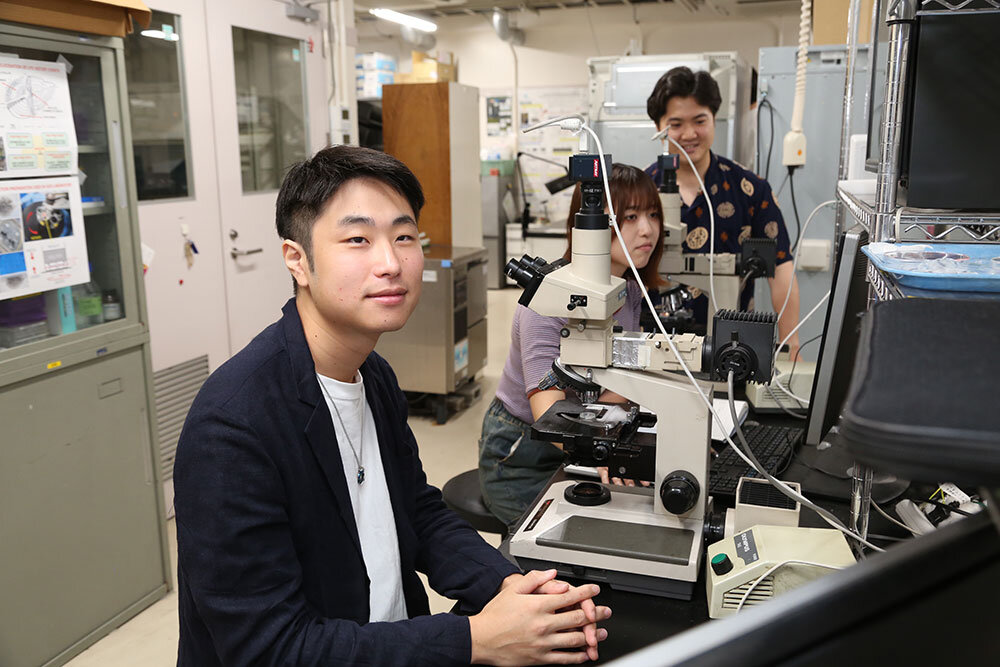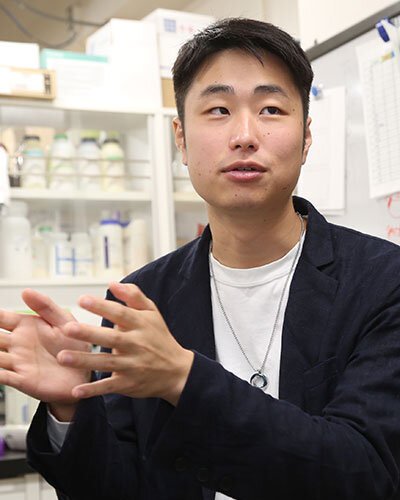INTRODUCTION学生紹介
- HOME
- support
- Student Introduction
- ITO YUIKAZU
STUDENT INTRODUCTION
Marine Life Sciences
ITO YUIKAZU
Specializations:Fisheries Biology
Main academic advisor:FUJIWARA, Yoshihiro
Mentor:MIYAMOTO, Ryusuke / YOKOTA, Masashi

Impressed by classes on understanding AI algorithms, aspiring to become an expert in mathematics and biology
Seeking clues to unravel deep-sea ecosystems from the otoliths of deep-sea fish
I am researching the otoliths of a deep-sea fish called sokobouzu in Japanese (cusk eel). Fish have structures called otoliths made of calcium carbonate in their heads, and by examining these otoliths, we can learn about their migration history and age. The primary focus of my research is determining the age of fish from their otoliths. When an otolith is split in two, rings similar to the annual rings of a tree can be seen, with layers accumulating as the fish grows. It is said that each ring corresponds to one year, but I want to investigate whether this is really the case and determine how many years one ring actually represents.
Very little is known about the ecology of fish living in the deep sea. However, it could be that these creatures play a crucial role in the deep-sea ecosystem even though we do not know it. Studying the otoliths of deep-sea fish might clarify the kind of ecosystem that exists in the deep sea and how its loss could negatively impact humans. This could potentially lead to useful information for our daily lives.
Goal: Using AI to analyze otolith images
I joined the WISE Program to learn about AI and develop a system that automatically recognizes images of otoliths captured under a microscope.
I have always been interested in mathematics, but not many research departments at TUMSAT deal with it. However, the WISE Program is different, and one of the main reasons I joined the program was that I wanted to pursue studies closely related to mathematics.
Since my undergraduate days, I have been independently studying statistics and even created a website on the subject, demonstrating my passion for learning. Therefore, I had high expectations for the classes in the WISE Program.
Agreeing with the WISE Program's educational philosophy
 Once the courses started, I was struck by the high level of the WISE Program classes and the students' high motivation. Despite the challenging content, the lessons are easy to understand, so I am learning a great deal.
Once the courses started, I was struck by the high level of the WISE Program classes and the students' high motivation. Despite the challenging content, the lessons are easy to understand, so I am learning a great deal.
One particularly memorable class was about artificial intelligence and machine learning. This class proved how machine learning models work using mathematical formulas and provided mathematical backing.
Artificial intelligence has become very familiar and easy to use nowadays if you want to use it. For example, packages on the internet allow you to implement machine learning just by typing a few lines of code. You can use them even without any knowledge of machine learning algorithms. However, I felt that this was a problem. Each problem you want to solve using artificial intelligence has unique issues, and there are algorithms that correspond to each of them. If you understand the algorithms, you can choose the appropriate one for each problem. However, if you only know one algorithm and do not understand its inner workings, you may think it can be used for everything. However, this approach does not allow you to handle different tasks.
I find immense value in classes that explain the substance of mathematical formulas, and I agree with the philosophy behind such courses.
Another fascinating class was one where we created a neural network algorithm from scratch using mathematical formulas. The WISE Program is full of interesting and useful courses. I want to keep improving my fundamental academic ability to the point where I can apply what I have learned in the program to my own research. I also want to acquire knowledge and skills that will enable me not only to use AI but also to give back to society.
Learning English with an eye on doctoral programs abroad
The WISE Program offers various types of support. Among them, I am particularly interested in English language training. This is because I may consider choosing a university outside Japan when I go on to a doctoral program. In that case, English will be essential. I also want to focus on English to expand my options.
Currently, I am conducting research in biology, and I am also interested in mathematics. By pursuing studies in biology and mathematics simultaneously, I want to continue research as an expert in both fields.

